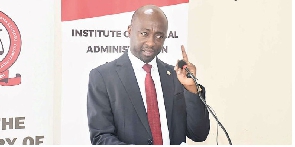Chief Registrar of the Judiciary of Tanzania, Mr. Wilbert Chuma yesterday urged newly appointed magistrates to ease case backlog in primary courts for timely delivery of justice.
The judiciary policy requires that hearing and determination of cases should not exceed six months except in special circumstances.
However, cases have been staying in court beyond six months and caused delay of justice.
“Up to now, the primary courts have maintained a lead in case resolution and the prevention of case backlogs. Therefore, we expect that your inclusion will continue to ease the workload and ultimately uphold the policy which aims to have no cases exceeding six months,” said Mr. Chuma who inaugurated an induction training for 37 new resident magistrates of the primary courts.
The training is organised by the Judiciary of Tanzania and facilitated by the Institute of Judicial Administration (IJA), Lushoto.
Mr Chuma encouraged the new magistrates to learn the use of Information and Communication Technology (ICT) to efficiently carry out their duties, especially as the judiciary of Tanzania is embracing technological advancements.
“The 21st century is dominated by the use of technology in serving citizens. Learn the use of ICT systems used by the court so that you do not face difficulties in doing your works,” he emphasised.
He also reminded the magistrates to observe the principles of human rights, the well-being of individuals and the national security.
Principal resident magistrate and director of judicial training at IJA, Dr Patricia Kisinda, highlighted the significance of the training, saying it aims to provide the new magistrates with guidelines to aid them in implementing their responsibilities.
“The significance of this training is to offer guidance to the new magistrates as they commence their duties, including the administration of justice which is their primary responsibility,” she said. She added that the magistrates will be provided with guidelines, instructions, and various principles related to the tasks they will carry out on rights administration. Participants had higher expectations from the training.
“These training sessions are highly important for us as they help us clearly understand our responsibilities so that we serve the citizens well,” said a new resident magistrate, Mr. Aden Ruvurahende.
Regarding the case backlog, he noted: “Dealing with the issue of case backlog in the courts is a challenge for us, but we are going to help resolve that matter.”
Another participant, Ms Salma Mwamende, said after the training, the judiciary should expect professionalism, efficiency, and accountability from them.
Africa News of Tuesday, 15 August 2023
Source: thecitizen.co.tz













